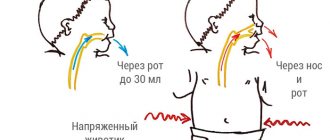Natural processes of grunting
It is likely that a newborn is groaning due to quite normal physiological processes. Going to the toilet for a baby can require too much effort: the child has to push, he begins to grunt and sulk.
If recently the child was crawling, having fun and smiling, but now he hid, froze, his face changed - the emotions of pushing appear on it, this indicates that the baby is relieving himself. As a rule, within a couple of minutes he will return to active actions again, and only the aroma from the diaper will remind him of what he just did.
Of course, if a newborn grunts during such “trips to the toilet,” there can be no talk of serious problems.
Newborn baby pushing while feeding
Another feature of the fact that the child is pushing under the breast or while feeding from a bottle may be the processes of natural bowel movement. Most children relieve themselves just under their mother's boobs: at this moment they relax completely, the tone in the intestines disappears, which is why spontaneous bowel movements occur. But sometimes you still have to make an effort: almost any mother will understand that the child is pooping or peeing at this time.
Colic
As a rule, colic usually appears in the third week after the birth of the baby. They can last until the baby is one year old. These unpleasant phenomena are accompanied by short-term cramps in the abdominal area, combined with poor appetite, cramping of the legs, and vomiting. Rarely, bowel movements may change during colic. Often because of this, the child loses weight, strains and groans all night, and cries a lot in pain.
Almost all parents have to deal with colic, due to the fact that the baby’s intestinal tract has not yet developed. A nursing mother should carefully plan her menu to protect her baby from unpleasant pain. Be sure to exclude foods that cause severe gas from your diet. During this period, it is better to give your child drinks that help improve digestion.
Swallowing air
An infant constantly grunts, strains and grunts, often burping if air gets into the intestines along with food. After each feeding, the mother should stand the baby upright, then put him on his side so that during belching the baby does not choke on the milk formula. Periodically, it should be placed on the tummy - this position promotes better gas formation, as well as strengthening the muscle tissue of the peritoneum.
What to do and how to help if a newborn baby constantly groans and strains?
If these processes are caused by flatulence and colic, try lightly massaging the baby's tummy.
The “bicycle” exercise will also help get rid of gases - when the baby is lying on his back, you lift his legs and alternately bend them at the knees, bringing them closer to the tummy - as if the baby is pedaling a bicycle. You can also simply press the knees of both legs to your tummy at the same time.
To avoid colic and gas, for prevention, do not forget to place the baby on the tummy before feeding and leave it in this position for several minutes. And after feeding, hold it upright so that excess air can escape. At the same time, babies often burp. Place your baby correctly on your breast to prevent him from swallowing air.
In addition, pay attention to your diet: if a nursing mother eats foods that cause increased gas formation, the baby will have colic. And if the baby is bottle-fed, make sure that the hole in the nipple is not too large - it also causes air to be swallowed and gases to form in the tummy.
Blocked nasal passages
Because babies have an excessively small nose, any blockage can make it difficult for air to pass through the nasal passages. If a child groans and grunts in his sleep, most likely he is tormented by crusts in his nose, which prevent him from breathing normally.
Often, because of crusts in the nose, the child begins to behave restlessly when feeding: the baby either takes the nipple into his mouth, then releases it, tosses and turns, and begins to be capricious because the mother’s breast is nearby, but he cannot satisfy his hunger.
It’s easy to make sure of this: clean your baby’s nose. If your nasal passages are clogged, the ear stick will show it.
Physiological age characteristics
All systems and organs of a newborn are not yet fully developed.
Several age-related characteristics of a small organism can cause concern, but they are not a disease or pathology:
- various inconveniences (described above);
- binge eating;
- formation of dry crusts in the nose due to dry indoor air.
Frequent observations of your child will help you over time to distinguish the cause of crying and quickly eliminate it.
Uncomfortable clothes
Today, many parents are trying to select high-quality, pleasant to the body, vests, diapers, and overalls for their baby. Occasionally, things are sewn incorrectly: the fabric is not soft enough, with the addition of synthetics. This leads to the formation of unnecessary folds if the cut is incorrect. The baby is unable to unwind and straighten things on her own. Therefore, the baby begins to toss and turn and groan from discomfort.
Due to skin irritation, psychological balance is disturbed, the baby is anxious and sleeps disgustingly. Sometimes the cause of inconvenience is not only clothing, but also folds formed in the bed linen.
Wants to get mom's attention
Very often the baby tries not only to attract the mother’s attention, but also to show his dissatisfaction with something. If he fails to roll over or crawl on his own, the baby begins to get angry, which is accompanied by groaning. Often during such periods, the child begins to scream so that the mother hears and comes to the rescue. In this case, you should not give in, you should not pay attention, because the child can get used to constant help and scream and call for him at every difficulty.
If the baby begins to push and his face does not turn red, he does not scream, but simply does something, putting in maximum effort. Let's say a baby is clutching a rattle with emphasis and trying to study it thoroughly.
To figure out what exactly the baby is trying to portray by grunting - dissatisfaction or joy, it is better for the mother to watch him. If during the grunting he remains just as cheerful and cheerful, then there is no need to panic.
Newborn baby pushing in his sleep
Special attention should not be paid to the fact that this happens in a dream. Because it usually doesn’t matter when exactly—during periods of wakefulness or sleep—the child pushes. For any of all the existing reasons, this can also happen in a dream. If the baby does not wake up (that is, he does not hurt anything, he does not cry, but only strains or moans), then most likely he is hot or hungry, perhaps experiencing some other discomfort, or simply decided to relieve himself. A common cause of children's "noises" during sleep is excessively dry air in the bedroom, which causes nasal mucus to dry out, forming crusts in the child's nose: maintain the humidity in the child's room at least 50%.
Or maybe the baby is dreaming about something?.. We wish that nothing interferes with your child’s sleep!
Especially for - Margarita SOLOVIOVA
Grunts and looks for breasts
Often, grunting is a sign that the child wants to eat. At the same time, the baby becomes mobile, constantly opens his mouth, tries to latch onto everything that is next to him, and actively sucks the pacifier.
Also, if the child wants to fill his stomach, his muscles begin to tense, he clenches his fists, spins and arches his back. Makes demanding sounds. If after the mother gives the breast to the baby, but he does not take it, grunting may signal another problem.
When to see a doctor
Hydrocele of the testicles in newborn boys - what is it, symptoms and treatment
If the child grunts and strains all the time, parents will be able to cope with most of the problems on their own. In some situations, medical assistance cannot be avoided. You need to see a doctor if:
- there is an increase in body temperature;
- the child refuses to eat and has stopped gaining weight;
- the baby constantly burps profusely;
- constipation and bloating are regular;
- traces of blood and a large amount of mucus appeared in the stool;
- the baby arches his back, cries in his sleep and during wakefulness.
Such symptoms indicate problems with the baby’s health or significant disruptions in care. A pediatrician will help establish the cause and correct the situation, who will explain why newborn babies groan and what needs to be done in each situation.
Tingling lanugo
More newborns are born covered in lanugo, light-colored, fine hairs on the back, shoulders, and other areas of the body. Over time, the hair becomes matted and falls off. But if the baby experiences severe discomfort: tingling, heat, etc., he can be helped. To do this, mothers bathe their babies in herbal decoctions that soothe the skin. It is also necessary to moisturize the skin using special oil or milk. The child is dressed in cotton clothes that are pleasant to the body. By frequently changing positions from one side to the other, on the stomach and on the back, it will be possible to quickly promote the rolling down of the embryonic fluff.
The child grunts and strains while sleeping
It is quite natural for a baby to snore, grunt and sob. It’s bad when a child tenses up and tightens his legs. This indicates intestinal problems. It can also signal infectious and nervous diseases. Often this phenomenon becomes the cause of overeating or undereating.
In order for the baby to be calm and sleep fully, parents should maintain a comfortable temperature in the room and regularly ventilate the room, because the baby may simply feel stuffy. The absence or lack of fresh air, physical activity and emotional warmth negatively affects the condition of the newborn. It is important to try to adhere to a feeding and rest schedule, especially until the baby turns one year old.
It is important to regularly wash your baby, change his diapers and diapers, and lubricate the folds with cream. It is recommended to wash the baby in a decoction of string, potassium permanganate or chamomile on the eve of lights out.
Neurological problems
Sometimes the most dangerous cause of groaning in a newborn is neurological health problems or congenital pathologies. Such diseases can develop in the womb or subsequently during difficult childbirth.
Possible deviations can be recognized by groaning, combined with the following symptoms:
- constant low temperature of the extremities;
- weak or strong tremor of the toes, hands, chin;
- increased sweating of the extremities;
- increased excitability;
- marbled skin color;
- sleep problems;
- periodic occurrence of seizures;
- increased muscle tone;
- problems with intracranial pressure.
If a child exhibits such symptoms, this may lead to the development of hyperactivity or absent-mindedness in the future. In more complex situations, mental, speech and psychomotor development may be delayed.
When does a child need to be seen urgently by a doctor?
A baby's groaning does not always indicate mild discomfort. Occasionally, newborn babies begin to groan due to the development of very dangerous diseases.
It is important to call an ambulance in time or consult a specialist yourself if groaning is simultaneously accompanied by the following symptoms:
- vomiting;
- causeless drowsiness;
- profuse belching and the one that appears after each feeding;
- the appearance of symptoms of weakness;
- decreased physical activity;
- the appearance of a rash on the skin;
- refusal to eat;
- a sharp increase in temperature;
- weight loss;
- constant bloating, colic;
- stool instability.
To alleviate the child’s condition before the doctors arrive, he should be placed on his left side. In this position, severe abdominal pain disappears, and the likelihood that the newborn will choke on its own vomit or belching is prevented.
Very often, parents are convinced that excessively frequent grunting, dissatisfaction and screaming are a sign of something more serious. But, in fact, there is no hidden meaning in this, and groaning is a normal natural process inherent in a newborn baby. But if there is any doubt, it is better to show the child to a pediatrician to make sure there are no serious pathologies.
Do I need to see a doctor if my newborn baby is groaning?
- It is best to be constantly in touch with your family pediatrician, especially in the first 3 months, which are the most important and responsible. The doctor should be informed about groaning, pushing, and other reactions of the child and changes in his behavior.
- It is easier for the doctor to determine what causes a particular reaction in the baby, and he can always advise not only remedies or exercises to alleviate the child’s condition, but also suggest how to eat properly for the mother, so that overcoming the difficult period of development and formation of the child’s body is comprehensive. If necessary, the doctor will discuss the diet , necessary and prohibited foods for a nursing mother.
- Usually, children's doctors themselves urge young parents not to panic if, up to 3 months, the child periodically groans, strains, and bends. As a rule, by the fourth month of a baby’s life, the work of all systems of his body begins to stabilize and become harmonious. Periodic telephone consultations with a local pediatrician are sufficient. But if a child begins not only to groan, but also often starts crying, then contacting a specialist is necessary.
Consult a doctor only in certain cases.
Groaning, straining, sniffling, blushing - all this is absolutely normal for a healthy child. You need to sound the alarm in the following cases:
- The baby begins to burp not immediately after eating, but after an hour or more, the regurgitated mass is significant (about a tablespoon);
- The baby defecates frequently and loosely;
- Blood is noticeable in the stool of a newborn baby;
- The child begins to turn away from food, although enough time has passed since the last meal;
- Poor weight gain;
- The child is often constipated for several days;
- The child becomes lethargic or, conversely, overexcited;
- A rash appears on the baby's body .
Fortunately, much more often babies grunt and bend over simply because they do not yet know how to make other sounds and perform other movements. Let this be the case with your little one!
Useful articles about children:
- Why doesn't the child listen?
- What to do if your child constantly lies
- The child is a bully - what to do
- Slow child-hoarder
- Newborn baby sneezes











